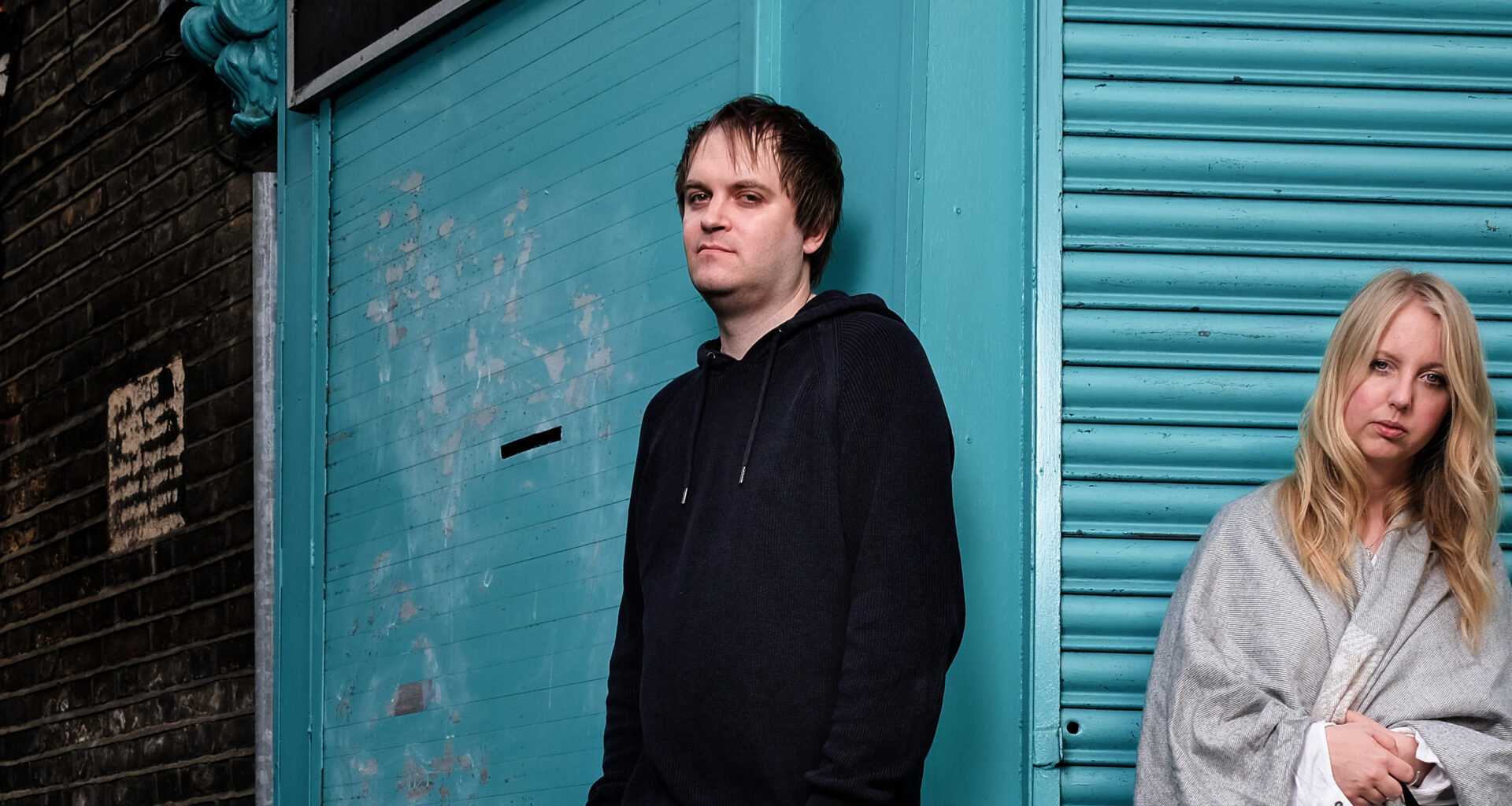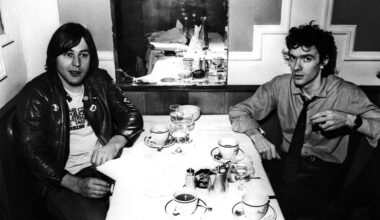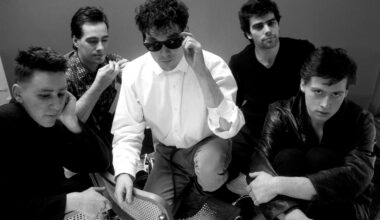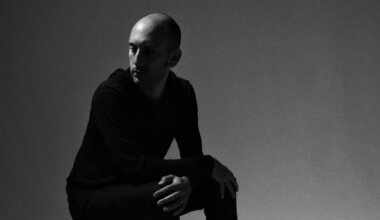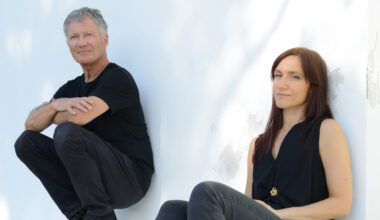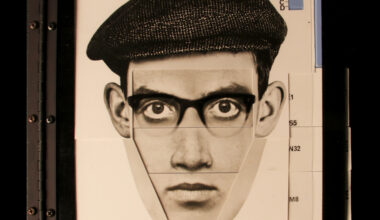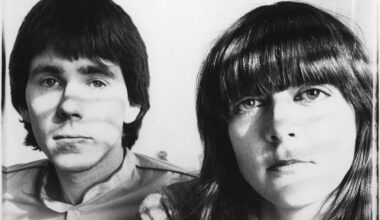OnDeadWaves is a fascinating collaboration between Mute artists Polly Scattergood and MAPS, also known as James Chapman. Their self-titled album is one of the most melancholic records you’ll hear all year, but they insist there are nuggets of hope sparkling in the sadness
The story of onDeadWaves revolves around two renowned electronic artists who came together and made a record that wasn’t particularly electronic. Two souls with individual talents who met, decided to coalesce creatively, and ended up crafting something quite special.
James Chapman, one half of the duo, you may already know as Maps, the 37-year-old musician and producer behind 2007’s Mercury Music Prize nominated ‘We Can Create’. Polly Scattergood, the other half, signed to Mute Records at the tender age of 22 and has also enjoyed success in the nine years since then, most recently with ‘Arrows’, her intoxicatingly melodic 2013 album. Together, their onDeadWaves project breaks generic boundaries and sketches a landscape of loss, yearning, beauty and charm that mixes strong acoustic flavours – hear fingers on fretboards! – with gleaming electronica.
‘Blackbird’, the haunting opening track of their self-titled album, features atmospheric, reverb-soaked guitar lines and a half-sung, half-breathed vocal by Polly that sounds like she’s been up all night crying and drinking whisky. The album unfolds thus, an alluring and often sad suite of songs like ‘Hollow’ and ‘Alice’, where slowly strummed and gently picked strings combine with melancholic vocals. It also features an incredibly wistful cover of the pop and jazz standard ‘Autumn Leaves’ (previously performed by Nat King Cole and Frank Sinatra), with Polly and James duetting over sultry guitars and an icy electronic drift.
The starting point for the unique alchemy that birthed ‘onDeadWaves’ dates back to 2011, when the pair first met while performing at a two-night showcase for Mute Records at The Roundhouse in London. So what were their initial impressions of each other?
“Be careful what you say, Polly,” laughs James. “We met in a cafe before the Roundhouse gig. I remember thinking she was really nice.”
“Thank you,” interjects Polly.
“She was just very easy to get on with,” he adds.
“We’re both pretty chilled,” says Polly. “We knew each other’s work – I’m a big fan of Maps and the things James has done in the past – and we’re also into a lot of the same music. We have shared influences from artists like Mazzy Star and Low, so I think there was naturally a bit of a rapport between us.”
A little later on, Polly and James talk about the filmic inspirations for the album – David Lynch, ‘The Shining’ and Dario Argento’s horror flicks all get a mention – and how there are art world flashpoints too, like Edward Hopper and Gregory Crewdson. So far so good. Two kindred spirits with laid-back and sensitive natures getting together to explore common ground. I’m quite surprised it took them so long to actually do something creative with their friendship, though. The turning point came in 2014, when Polly travelled from her home in London to visit James at his place in rural Northamptonshire.
“There were no plans to record anything at that point,” she says. “But we ended up writing something together that sounded good, then I stayed the night, and then I didn’t leave for a while.”
Located in the Northamptonshire countryside, something about the bucolic setting of James Chapman’s house and studio seems to have touched Polly Scattergood deeply, seducing her away from her hectic urban life in London and transporting her to a space where she felt primed to write. The pair worked on ‘onDeadWaves’ over the course of a year or so, with Polly making the journey up to Northamptonshire to stay with James once or twice a month, sometimes staying for a couple of days, sometimes a lot longer. And all the time they worked on the album, they barely saw a soul.
“We didn’t really go out much,” says James. “I think I took Polly into town once and that was it.”
“And you only did that because we had to go and buy some guitar strings,” adds Polly. “I remember we spoke to the guy in the shop. He was wearing a suit and a tie and we thought he looked very smart, but he was the only person we interacted with while we were recording.”
This might seem like a minor, utterly inconsequential incident, but when you’re locked away from the wider world, cooped up in some sort of Howard Hughes-style retreat, fleeting encounters like this take on a pregnant significance. What is a quickly forgotten meeting for most people can be a major melodrama for your serious hermit, an event imprinted on the mind and analysed over and over. I had heard that James was something of a recluse, so how serious a hermit is he?
“I don’t go out much,” he admits. “I think Polly and I both just like peace and quiet.”
“I love solitude,” says Polly calmly.
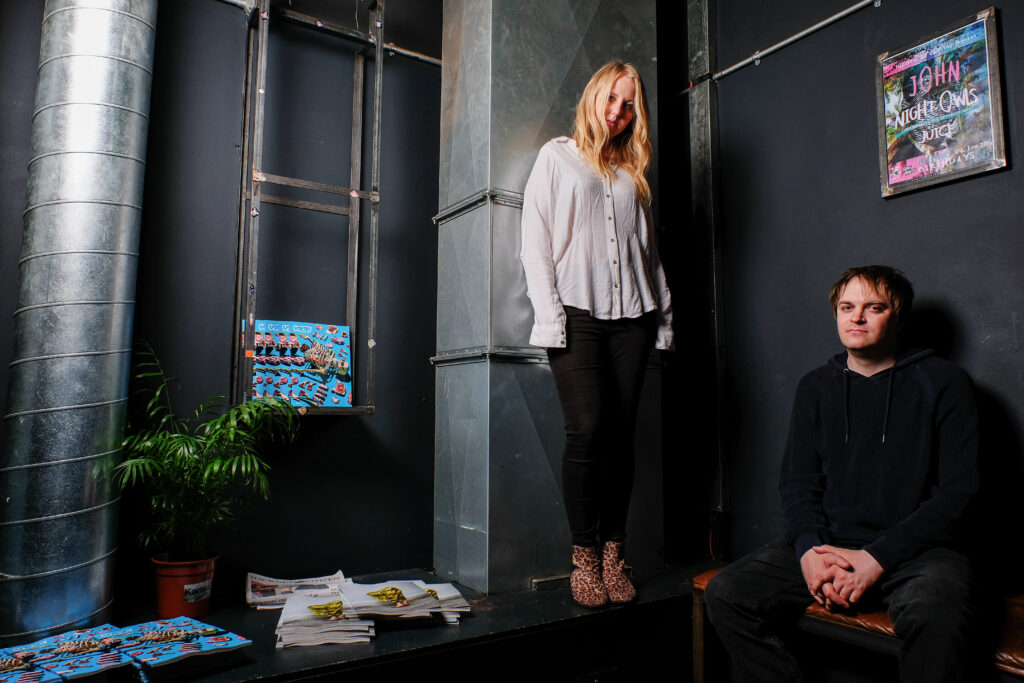
But being holed up together for long periods of time with very few outside interactions must have made them go a bit crazy, mustn’t it? And they would have had lots of arguments, wouldn’t they?
“Not really,” says James. “We had disagreements, but we’re not the sort of people to get hung up on those. And you have to be able to express yourself. That’s an important thing to do. I mean, working together is often more about saying when you don’t like something than about saying when you do. A lot of arguments happen when people try to keep their real thoughts to themselves and then they suddenly explode.”
“We certainly didn’t have any explosions or fights,” laughs Polly.
Polly and James both say they are nocturnal creatures and they tend to work better at night than during the day. They worked long hours during the writing and recording of ‘onDeadWaves’, each day gradually and imperceptibly turning into night as they honed melodies and Polly worked up lyrics.
“We’re both night owls, so we start waking up when it gets dark,” notes James. “Most days, we’d start at around 10 in the morning and go right through to the early hours of the next day, then grab a bit of sleep before starting again. We pretty much worked day and night.”
With such a relentless schedule, such a strong focus, it’s amazing that the album doesn’t sound a lot more intense than it does. They say they didn’t even break to go out for a walk in the fields surrounding James’ house. They admit to starting each sunny day with a cup of tea in his garden, though.
“Oh, James’ garden is really beautiful and we’d sit there quite often in the summer months,” says Polly. “I especially remember the lavender.”
It all sounds very idyllic. Very romantic too. Not that you should get the wrong idea by me saying that. No, no, no, no, no.
“I’m happily single,” says James confidently.
“And I’m happily married,” notes Polly. “My husband is also a musician and he collaborated with me on ‘Arrows’. That’s how we met. He’s been really supportive and understanding of my need to make this album and he really loves what we’ve done. I played him a few of the first tracks we did and he was very encouraging, telling me to keep persevering with my ideas. Loads of my friends are male, actually. And loads of James’ friends seem to be female.”
I get the feeling that the intimate and absorbing nature of the ‘onDeadWaves’ sessions has had a lasting impact on the participants. Is that right, James?
“I’d never collaborated with someone like that before, I’d been used to working completely on my own and not letting anyone else into the process, so it’s been a very new way of approaching music for me,” he replies. “I’ve definitely learned a lot from the experience. Working with another person means the result is always going to be different to what you might expect because you’ve got two heads instead of one. I guess I’ve also learned to let people into my space more often!”
So James was a solitary character, pretty much just happy in his own company, who has opened up to the pleasure and pain of a shared creative project. Did working with James offer any lessons for Polly too?
“One of the important things for me was being in the moment and enjoying every bit of it as a result of that,” she says. “In the past, when I was making my solo records, I would spend hours and hours deliberating over every tiny sound, all the drum sounds and that kind of stuff. With this record, we both made a conscious decision not to get hung up on the small technicalities of things. We decided to just go for a vibe and enjoy that vibe without really thinking about it too much.”
This was most probably helped by not having some great master plan for the album. Or any preconceived ideas at all, really. As the record evolved, the duo found that they interacted on an increasingly intuitive plane, and having the freedom to riff on emotions and go where the mood took them is perhaps part of the reason why they produced such a haunting and atmospheric sound.
“This album is really quite abstract in places,” admits James. “A lot of it is about a feeling. A lot of times, Polly would be scribbling away at the lyrics and I’d be working on musical stuff, and then we’d just kind of do it and not talk about it.”
“It was like instinctively understanding each other,” adds Polly.
I ask Polly about some of the lyrical concepts on the album, but she’s not too communicative to begin with. When I press her, she finally acknowledges that if ‘onDeadWaves’ has a theme it’s one of loss and longing.
“There’s a lot on the album about losing precious things in your life,” she reveals. “But it’s about overcoming that and the journey you take, the ups and downs and highs and lows of the journey of life. So I don’t think it’s a sad album, it’s an album about looking to the future and staying positive.”
I question her about the sort of “precious things” she’s talking about, but again she’s not very forthcoming.
“We all experience loss in our lives,” she says, somewhat gnomically.
Has she ever lost a close family member?
“Friends,” she says.
She won’t be drawn further, but what’s interesting about this is Polly’s lyrics and phrasing, plus her very distinctively shivery voice, suggest someone who has been touched by their fair share of anxiety and trauma. ’Blackbird’, for example, which has lines like “I’ve got a big black bird in my bedroom / He keeps singing to me / He says you will not believe / The shit I have seen”, comes on like an avian version of the “black dog” metaphor Winston Churchill famously used to describe his bouts of depression. Maybe her bohemian upbringing – her mother was an artist, her father an actor – have made it easier for her to vocalise deep and often dark feelings. Or maybe she’s simply wise beyond her years.
James has likewise been through some tough periods in his time. He dropped out of Reading University after a year due to health problems. Listening to them singing ‘Autumn Leaves’ – “I miss you most of all, my darling / When autumn leaves start to fall” – I suspect neither of them has had an entirely smooth ride of it. Their ability to dig out little nuggets of beauty from the emotional pain is quite an achievement, then. And with ’onDeadWaves’, it makes for very compelling listening.
‘onDeadWaves’ is out on Mute
